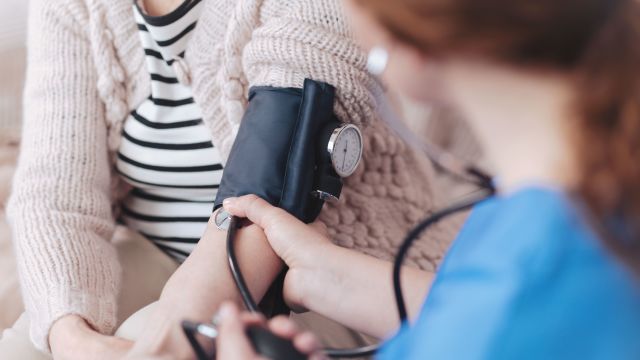Updated on September 27, 2024.
Hypertension and dementia are primary health concerns for those in later life. Nearly half of all adults in the United States have high blood pressure, according to the American Heart Association. Research supported by the National Institute on Aging also suggests that Alzheimer’s disease is underreported and ranks as a leading cause of death among older adults, after heart disease and cancer.
Blood pressure is known to be associated with both stroke and dementia, according to Zoe Arvanitakis, MD, MS, of the Rush Alzheimer’s Disease Center at Rush University Medical Center in Chicago, and a Fellow of the American Academy of Neurology. She's the lead author of a study published in July 2018 in Neurology aimed at deepening our understanding of this connection.
What researchers found
For the study, healthcare providers (HCPs) followed 1,288 patients in the last years of life, taking their blood pressure annually, then searching for evidence of brain disease after death. Dr. Arvanitakis and her colleagues looked for three different malformations common in diseased brains:
- Plaques, protein that accumulates and hardens in the spaces between nerve cells
- Tangles, twisted fibers inside the brain cells
- Infarcts, an area where brain tissue is damaged due to an interruption in blood supply, which can happen during a stroke
These lesions were found to be linked to a higher-than-average systolic blood pressure (SBP, the top number in a BP reading) and a higher diastolic pressure (DBP, the bottom number). For example:
- A person whose SBP averaged 147 mmHg had a 46 percent increased risk of having one or more brain lesions than someone with a SBP of 134 mmHg. This represents the equivalent of approximately nine years of aging.
- A diastolic measurement of 79 mmHg had a 28 percent greater risk of infarcts compared to someone with a DBP of 71 mmHg.
High SBP late in life was also associated with a greater number of tangles in the brain, but somewhat surprisingly, not a higher number of plaques. In addition to high blood pressure, those who exhibited a faster-than-average decline in systolic blood pressure also showed a higher risk for infarcts. While a decline in blood pressure is normally good, it’s also been associated with an increased risk of mortality in the very old. The researchers speculate that this rapid decline in people with clogged arteries could lead to decreased blood flow to the brain, producing a higher risk of infarcts. But further research is needed to clearly establish this link.
How to help protect your brain
So what does this mean for you? So far, nothing has changed in the way we treat these diseases, but there are steps you can take to safeguard your brain health.
- If you have high blood pressure: Continue to work with your HCP to manage it, whether that’s through lifestyle changes alone or with the help of medication.
- If you have risk factors for Alzheimer's disease: Consider looking at your diet and activity levels, as well as your lifestyle behaviors, to see where you can make some healthy changes. Talk to a medical professional about your concerns.
“More research is needed on the effects of blood pressure in older persons on the brain, and to determine what blood pressure targets should be in older people, before clinical guidance can be provided,” says Dr. Arvanitakis about the study’s results. This research is just the beginning, but it could lead the way for new discoveries, and a much better understanding of the links between late-life blood pressure and the brain.







